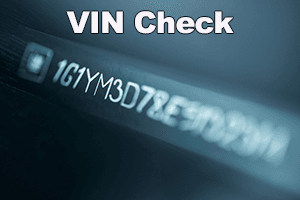Texas VIN Lookup
If you want to know more about a vehicle, either your own, or a pre-owned car that you're interested in, a Texas VIN lookup will give you all the information you need. The VIN, or vehicle identification number, holds a wealth of useful information about a vehicle. This might include manufacturer options and specification, the vehicle's history, title information, accident history, safety recalls, ownership details, and more. This 17 digit identifier is linked to a multitude of information that can be found with a quick online VIN check.
Why is a Texas VIN Check Important?
A TX VIN check is important for many reasons, most commonly because it reveals hidden details about a car's past. For example, if you're buying a used car, a VIN search can help you avoid vehicles with serious issues like accident damage, theft, or faulty repairs that could cost you time and money down the road. It's also a means to access title information to verify the vehicle's legitimacy.
What Can Be Found with a Texas VIN Search?
Performing a TX VIN search can unlock important details about a vehicle's past. It's shows vital records that for the would probably stay a mystery unless you check the history of a vehicle. Here’s what you can typically find:
History Details: A VIN search can reveal the entire history of a vehicle, including how many previous owners, registration and title details, and any reported accidents. This information helps you understand how the vehicle has been used and whether it was involved in any serious incidents.
Title Information: This search can also show if the car has a clean title or if it’s been salvaged, rebuilt, or declared a total loss. A clean title means the car hasn’t suffered significant damage, while a salvaged or rebuilt title suggests the vehicle has sustained substantial damage in the past.
Odometer Readings: A Texas VIN search often include odometer readings, which helps to verify the accuracy of the mileage reported by the seller. This is important because tampering with odometers to show lower mileage is a common scam in the used car market. This search can also show if the odometer reading is accurate.
Recalls and Defects: You can also discover if the car has any outstanding recalls or known defects that need to be addressed. This ensures you’re aware of any safety issues that could affect the vehicle's performance and your safety.
Theft Records: Running a search on the vehicle identification number can also alert you if the car has ever been reported stolen. Knowing this prevents you from buying a car that could potentially be confiscated by law enforcement.
How to Run a Free Texas VIN Check
Running a free VIN check in Texas can be done either through state agencies or third party providers. There are multiple ways to do it for free. Here are the basic steps:
Step 1: Locate the VIN: Before you can perform a free VIN check, you need to locate the 17 digit vehicle identification number on the car. It’s usually found on the driver’s side dashboard, visible through the windshield, or on the driver's side door frame. You can also find it on the vehicle's registration documents or insurance papers.
Step 2: Use Online Resources: There are multiple free online resources where you can conduct a VIN check:
1). National Highway Traffic Safety Administration (NHTSA): You can use their website to check for recalls and safety issues.
2). Texas Department of Motor Vehicles (TxDMV): Offers a VIN lookup tool that can provide basic information about the vehicle.
3). NICB (National Insurance Crime Bureau): Offers a free VIN check service for potential theft or salvage records.
Step 3: Review the Report: Once you've completed the VIN check, carefully review the report. Pay attention to any red flags like salvage titles, previous accidents, or unexplained mileage discrepancies. This information will guide your decision on whether to proceed with the purchase.
Will a Free Texas VIN Check Show the Vehicle History?
While a free VIN check will reveal a lot of useful information about a vehicle, the free checks usually do not show the complete vehicle history. For complete and detailed history reports, you will most likely need to pay for these. If you are purchasing a pre-owned vehicle from a dealership, they will most likely provide you with a free vehicle history report.


